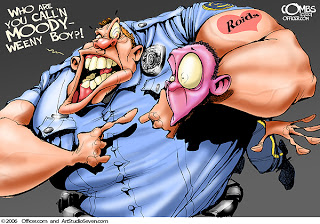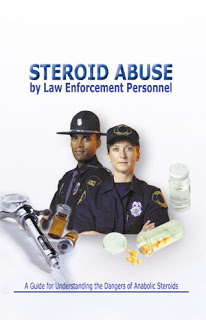 Steroid-enhanced uber-villain Bane.
Steroid-enhanced uber-villain Bane. Seeking to fine-tune the utopia of peace, plenty, and progress that is the United States of America under the reign of Bush the Dumber, the Drug Enforcement Administration recently carried out what the State stenographers in the prestige press call the “largest crackdown in American history on illegal steroids.”
“Operation Raw Deal” was not merely multi-jurisdictional, but multi-national in scope: Agents from the DEA and the Food and Drug Administration executed 143 search warrants, arrested 124 people, shut down 56 domestic steroid labs, and collaborated with counterparts in nine foreign countries. And since this was a “drug war” initiative, officially sanctioned theft was part of the program as Feds “forfeited” 25 automobiles, three boats, 71 firearms, and $6.5 million in cash.
All of this was done to protect the public against ... well, against what, exactly?
Steroid abuse (there are clinically appropriate uses for steroids) is perhaps the ideal specimen of a malum prohibitum – something that is a “crime” only because the State has so decreed. Born of vanity and hopelessly skewed priorities, steroid abuse is among the stupidest of the myriad varieties of self-inflicted damage practiced by flawed and fallen human beings. But the key here is that it is self-inflicted -- and the State has no legitimate jurisdiction (except in one case I'll get to anon) to forbid or punish steroid abuse.

Like most in his line of work, the late professional "wrestler" Chris Benoit -- who killed his wife and disabled son in a murder-suicide earlier this year -- used steroids. But his lethal breakdown may have had more to do with prescription anti-depressants than illicit testosterone boosters.
I grant that the use of steroids and other performance enhancers has tainted professional sports, and that the resulting accomplishments should be considered fraudulent. But the Feds – you know, the charming folks who relentlessly debase the currency and compel us to use it under threat of official violence -- have neither the constitutional mandate nor the moral standing to punish athletes who undermine the competitive integrity of their chosen sports.
“Roid rage” -- a condition characterized by sudden, explosive bouts of abnormal aggression -- does appear to be a legitimate problem, albeit one that has been defined largely through anecdote, rather than clinical studies. It's difficult to see how that state of mind is inherently worse than alcohol-induced intoxication and the resulting impairments. This suggests to me that however widespread the problems associated with unsupervised individual steroid use might be, they're nowhere near as serious as the much more common problems associated with our society's most commonly used mood-altering drug, alcohol.
There is at least one serious steroid-related problem that government should address, and most likely will not: The growing use of steroids by police officers.

Falling Off the Thin Blue Line, a recently self-published memoir by former Texas police officer “David Johnson” (the name is a pseudonym), describes the author's “addiction” to steroids, his side-line career as a steroid dealer, and his impressions about the extent of steroid use among the State's armed enforcement agents. (I'm sure I'll have more to say about “Johnson's” book in the future.)
This is not a recent development. The FBI Law Enforcement Bulletin reported in 1989: “Anabolic steroid use by police officers is a serious problem that merits greater awareness by departments across the country.” This assessment came a year after Congress banned the “unauthorized” possession and use of steroids by the public.
According to former police officer and longtime police psychologist Gene Sanders, “There is sort of an underground, unspoken tradition among several departments that I've worked with that if you really want to bulk up, this [steroid use] is the best way to do it.... The thinking is that big is better than small, tough is better than weak.” Implicit in that “thinking,” of course, is that a police officer should be a physically intimidating presence.
I'd bet platinum to potato chips these guys were juiced.
Joe Occhipinti, executive director of the National Police Defense Foundation and a highly decorated former street officer, insists that “Any officers saying they need to take steroids to perform their jobs, I don't buy it. If you need to subdue a guy, and he's 6'2” and 300 pounds, you request backup!” This makes sense to police veterans of Occhipinti's cast of mind, who don't define their role in terms of the ability to dominate and intimidate others. Unfortunately, it's the dominate-and-intimidate mindset that defines most contemporary police work – and the resulting steroid use has become deeply entrenched in police departments across the nation.
A November 1989 “60 Minutes” story entitled “Beefing Up the Force” featured “interviews with three police officers whose use of steroids had apparently caused the hyper-aggressiveness that had gotten them into serious trouble,” recounts Dr. John Hoberman. “The worst case involved what one psychiatrist called `a real Jekyll and Hyde change' in the personality of a prison security guard in Oregon who had kidnapped and shot a woman who made a casual remark he didn't like.” At the time the crime was committed, the guard had a testosterone level fifty times higher than normal.
The “60 Minutes” piece focused on a “hard core” group of steroid users on the Miami police force – seven officers called the “River Cops” who in 1987 were implicated in cocaine dealing and conspiracy to commit murder. The trial of an accused murdered of a Broward County Deputy Sheriff suggests that steroid use is still very common among law enforcement officers in that community: An autopsy found anabolic steroids in the slain deputy's muscle tissue, and the accused killer claims that he acted in self-defense when confronted with irrational aggression from the steroid-inflamed officer.
In the late 1980s, Houston police officer Scott Tschirhart, an amateur bodybuilder and known anabolic steroid user, was involved in three lethal shootings of black suspects under exceptionally suspicious circumstances. His fellow officers had observed a distinct change in his attitude and disposition as he cycled through his “gear.” “The bigger he got ... the worse he got about strutting around and bragging,” one of them recalled. “You could really see him changing.” But nothing was done until after Tschirhart was involved in three fatal shootings, and then the only sanction he faced was expulsion from the force.
As of 2004, police in nine states had been accused of crimes related to steroid abuse. The Boston Police Department is still dealing with a recent scandal involving a drug ring inside a police motorcycle unit that dealt in both steroids and cocaine. The accused ringleader, Roberto Pulido, allegedly obtained steroids from a drug dealer in Greece and sold them to at least two other officers. An FBI inquiry into the drug ring resulted in new policy requiring steroid tests for Boston Police officers.
Although disclosures of this sort are uncommon, it's clear that we're not seeing a handful of isolated cases.
“Officer Jimmy,” interviewed by Men's Health for an October 2004 expose, reported that “Steroid use is very pervasive in law enforcement. I'd say, of the cops I know, 20 percent to 25 percent of them are using” steroids. “Jimmy,” who became a police officer in 2000, is a good representative of the new “dominate-intimidate” mindset: He believes – or at least believed at one time – that police are under-utilizing an important tool: “What law enforcement needs is a little testosterone. Every cop should do a [steroid] cycle a year.”

A March 2004 pamphlet published by the DEA's “Office of Diversion Control” underscores the reasons why steroids are so attractive to the likes of “Officer Jimmy”: “The idea of enhanced physical strength and endurance provides one with `the invincible mentality' when performing law enforcement duties.”
Of course, that conceit of invincibility may have more to do with the fact that the steroid-pumping cop carries a gun, is sheathed in body armor, clothed in the power to inflict lethal violence on others at his discretion – and can file criminal charges against any civilian who so much as touches him, or recoils from his touch.
If the government is going to regulate what goes into the bloodstream of individuals, it should focus exclusively on those in its employ, particularly the police. But the larger problem, as always, is the hypertrophied State itself.
On another subject....
Some of you might be aware of another part-time blog I maintain entitled "Notes on the Jerry Seinfeld Society." Since that blog deals with a subject of limited interest, I've not really tried to give it much exposure. The current essay, however, deals with something I consider to be important and more than a little disheartening.
Please be sure to visit The Right Source and the Liberty Minute archive.


10 comments:
You might have mentioned Ronnie Coleman, the winner of multiple Mr. Universe bodybuilding contests. He's supposedly a police officer down in Texas somewhere. Can't imagine how his department justified his activities.
Many departments will test cops and then they will suspend or fire the ones that test positive. Sometimes it's alcohol and sometimes it can even be other drugs. But, you will get fired.
So, how is the state condoning this?
"So, how is the state condoning this?"
My response to Marty is......WTF?! Did you read the article?
Anonymous -- I did NOT know that about Ronnie Coleman.
Marty, I noted in passing that Boston PD has a steroid testing program, and I appreciate you mentioning that other departments have moved in this direction -- which is a good thing. Most of the coverage I've read about this issue points out that there can be serious negative career repercussions for a cop who tests positive for 'roids. But the roid-head cops who end up in jail usually get there because of OTHER drug offenses, such as possession/distribution of cocaine or Ecstasy (one case involved a cop who traded a huge cache of Ecstasy for steroids).
Most of the time, a cop in possession of 'roids will be fired.
By way of contrast, private citizens are routinely sent to jail or prison for steroid "offenses." Take the case of Donnie Keith Wall of Texas, who received a 35-year sentence (!)for possession of steroids. Why this disparity? If there is a disparity in treatment between cops and citizens, it ought to work the other way around.
I'd prefer a regime in which cops could be permanently cashiered from police work for steroid use, with neither cops nor citizens facing criminal sanctions (and private citizens liable only to their employers for steroid use).
Yes, most PDs (at least those in major metropolitan areas) have steroid testing programs. But all of the circumstantial evidence so far, at least that which I've seen in the press, seems to indicate that punishment for those who test positive consists, at its most severe, of a slap on the wrist and a stretch of desk duty. Usually there is no punishment at all, which figures. Why wouldn't cops be given a free pass for violating a "drug law" they're supposed to enforce, just like the free pass they're given for all of their other crimes?
I watched Chris Benoit's father and a neurosurgeon on one of the morning shows last month, they showed a brain scan of Benoit. The physician stated it was not the steroids but rather the massive brain trauma sustained over a wrestling career that caused the mood swings and depressions and so forth in Chris Benoit and caused the tragedy. The father therefore is crusading to stop the use of metal chairs for hitting the heads of pro wrestlers.
How the American people put up with a government that tells them what to do is beyond my ken.
Bourbon = GOOD
Marijuana = BAD
WHY? Because Big Brother says it is so.
If one excludes improper diet, lack of exercise, and insufficient rest, the biggest threat to the average American's health is probably big government. The high taxes and currency debasement that are required to feed the ever expanding welfare/warfare/police state creates massive distortions and opportunity costs that cripple economic prosperity.
Not so long ago one income sufficed to maintain a household and raise a family. When debt and lack of savings are factored into the current picture, Americans were actually doing far better in the 50's, 60's, and early 70's.
police stake out kid for video taping them:http://www.thenewspaper.com/news/19/1988.asp
Scott Tschirhart
Denies ever using steroids. From the Houston Police Department, he became a Sheriff's deputy in a south texas county. in 1999, he passed the Texas Bar and has been a practicing attorney since.
While there are police officers who use steroids, I never did. I was conscientious about my job and the trust placed in me by the people of Houston. When this allegation came up, the Houston Police Department drew blood and we paid for our own tests. No steroids or any other drugs or indications of any past drugs were found. We even submitted hair samples. Nothing was found. This is conveniently omitted from the story. I wonder how much more of it is rumor and conjecture. Again, I categorically deny ever using steroids or any other illegal drugs before, during or after my police career.
Post a Comment